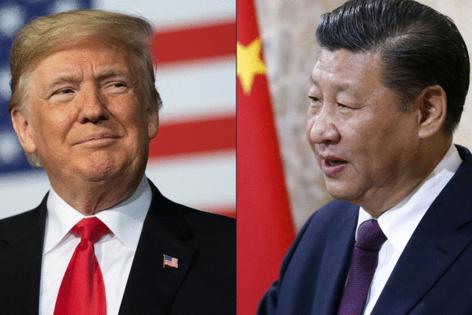China tells US to back off on threats, warns of retaliation
Published in News & Features
China said the U.S. should stop threatening it with higher tariffs and urged further negotiations to resolve outstanding trade issues, adding it will not hesitate to retaliate should Washington persist in its measures against Beijing.
President Donald Trump on Friday announced an additional 100% tariff on China as well as export controls on “any and all critical software” beginning Nov. 1, hours after threatening to cancel an upcoming meeting with Chinese leader Xi Jinping. That came after China added new port fees on U.S. ships, started an antitrust investigation into Qualcomm Inc., and unveiled sweeping new curbs on its exports of rare earths and other critical materials.
Beijing justified its moves as defensive actions and accused the U.S. of introducing new restrictive measures targeting China since talks between the two in Madrid in September, according to a Ministry of Commerce statement on Sunday. Last month, the U.S. Commerce Department unveiled a dramatic expansion of its export controls, which closed loopholes in current measures to block Beijing from cutting-edge chips.
“Threatening with high tariffs at every turn is not the right way to get along with China,” the Commerce Ministry said. “If the U.S. persists in its own course, China will resolutely take corresponding measures to safeguard its legitimate rights and interests.”
Last week Beijing unveiled broad new curbs on its exports of rare earths and other critical materials. Overseas exporters of items that use even traces of certain rare earths sourced from China will now need an export license, it announced Thursday, citing national security grounds. Certain equipment and technology for processing rare earths and making magnets will also be subject to controls.
Vice President JD Vance told China on Sunday that the U.S. has more leverage in the escalating trade dispute, saying the Trump administration is ready to be reasonable if Beijing is.
“If they respond in a highly aggressive manner, I guarantee you, the president of the United States has far more cards than the People’s Republic of China,” Vance said on Fox News’ "Sunday Morning Futures."
China’s export control is not a ban on exports, and applications that meet the regulations will be approved, the Commerce Ministry said Sunday. Before the measures were announced, China had notified relevant countries and regions through the bilateral export control dialogue mechanism, it added.
China has fully assessed the possible impact of the measures on the industrial and supply chains in advance and is convinced that the relevant impact is very limited, the ministry said. It added that the country is willing to strengthen dialogue and exchanges on export control with other nations to better maintain the security and stability of the global industrial and supply chains.
Beijing’s addition of new port fees on U.S. ships coincides with the date Washington plans to impose new charges on large Chinese vessels calling at American ports.
The U.S.’s implementation of Section 301 measures targeting China’s maritime, logistics and shipbuilding industries has severely harmed China’s interests and undermined the atmosphere of bilateral economic and trade talks, and China is resolutely opposed to them, the Commerce Ministry said.
The actions China took are “aimed at safeguarding the legitimate rights and interests of Chinese industries and enterprises, as well as maintaining a fair competitive environment in the international shipping and shipbuilding markets,” the ministry added.
On Sunday, China’s market regulator said it would proceed with an antitrust probe of tech giant Qualcomm. The State Administration for Market Regulation highlighted exchanges with Qualcomm over its acquisition of Israel’s Autotalks Ltd., according to a statement, following the announcement of the probe last week.
While Qualcomm had told Beijing it would scrap the deal in March 2024, it went on to complete the move without any communication, it said. The probe into Qualcomm is based on clear facts and solid evidence, the agency added.
_____
(With assistance from Jessica Sui, Fran Wang and Josh Wingrove.)
_____
©2025 Bloomberg L.P. Visit bloomberg.com. Distributed by Tribune Content Agency, LLC.







Comments